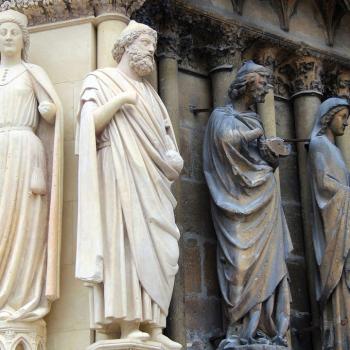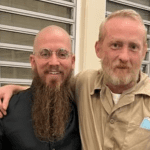Tribulation Force, pp. 94-104
Nicolae Carpathia, it turns out, is too busy to meet Buck for lunch at the Manhattan Yacht Club, so he's arranged to have Buck greeted there by their mutual friend, Chaim Rosenzweig.
It's not meant to, but this strikes me as suggesting that Nicolae is both responsible and considerate. Say what you will about the Antichrist's evil agenda, but you can't deny that he's putting in the time and working hard at it. Being so busy, he isn't able to turn his attention to his visiting friend, so he arranges to have Buck met by a Nobel laureate in his place. That's kind of classy.
Buck made his way through the crowd of tables to the booth by the window, where he was exuberantly greeted by his old friend Chaim Rosenzweig. The man knew enough to whisper in public, but his enthusiasm was boundless.
"Cameron!" the Israeli exulted in his thick accent. "How good to see you! Sit down, sit down! This is a lovely place, no? Only the best for friends of the secretary-general."
"Will he be joining us, sir?"
Rosenzweig looked surprised. "No, no! Much too busy. Hardly ever able to get away. Entertaining heads of state, ambassadors, everyone wants a piece of him. I hardly see him more than five minutes a day myself!"
This chapter is sprinkled with little asides like that "knew enough to whisper in public, but …" to contrast Buck's sophistication with his friend's loud lack thereof. Broad ethnic stereotypes, apparently, make embarrassing dining companions, confusing the salad and dessert forks and committing a host of other embarrassing faux pas. But we should note that Chaim is the one who shows the good manners here of greeting his friend properly. Buck is the one who doesn't "know enough" to say hello, instead greeting Chaim with a chilly, dismissive, "Is it just you?"
Several pages are exhausted with yet another rehash of how Buck and Chaim first met and of the last time they saw one another — which Buck remembers but Chaim doesn't because he was brainwashed to forget Buck's presence at that meeting. I get that Book 2 in a series requires the occasional review of events from the previous book, but it seems like two-thirds of Tribulation Force's 450 pages are devoted to such summaries while the remaining 150 pages of actual story line will itself be repeated and reviewed in Book 3.
So here we get the Rosenzweig variation of a conversation Buck has already had with Stanton Bailey and Steve Plank, with the brainwashing victim baffled by Buck's supposed absence from the meeting at the U.N.
"Where were you?" Dr. Rosenzweig asked.
"That's the question of the ages," Buck said. "Where are any of us?"
Rosenzweig's eyes twinkled, though Buck felt like a fool. He was talking gibberish, but he didn't know what else to say.
He really ought to have a cover story by now, a prepared answer for this question. Particularly since, after lunch, he's planning to see Hattie and Nicolae, both of whom, like Bailey, Steve and Chaim, are bound to ask, "Where were you?" Trying to evade the question might cut it with the others, but it seems urgently important that he be ready with an answer for Nicolae that won't lead the Antichrist to conclude that he Knows Too Much.
Having a cover story for the others is relatively easy. All they know, in their brainwashed state, is that Buck wasn't at the meeting, so any plausible-sounding excuse might work with them. But Nicolae will be asking this question fully knowing what really happened — knowing that Buck was there and knowing what, if anything, Buck is supposed to believe instead.
Buck's answer to Nicolae will thus involve a bit of gambling and guesswork. Buck knows what false memories Nicolae brainwashed into the others' minds, but he has no way of know what false memories he himself was supposed to have been brainwashed into believing happened. Nicolae may have tried to brainwash Buck into believing something specific — some particular explanation that would account for his supposed absence.
With the others, Buck could invent some story, telling Stanton, Steve and Chaim that, for example, he'd been mugged on his way to the meeting, held up at gunpoint and forced to miss being there. But that excuse wouldn't work with Nicolae himself. Nicolae knows where Buck really was, so he would know that the story was an invention — a conscious lie. There's a one-in-a-million chance, I suppose, that Buck might guess the exact alternative scenario Nicolae had tried to brainwash him into believing, but trying to make that guess wouldn't seem wise. Guess wrong and Nicolae would know that his attempts to brainwash Buck had failed — that Buck is probably a Real, True Christian, and therefore his enemy. And that this brainwash-proof enemy likely remembers seeing Nicolae fire the bullet that killed Stonagal and Todd-Cothran.
Buck's best chance, then, would be to apologize profusely while remaining as vague and confused-seeming as possible about where he thinks he really was. "I'm so sorry I wasn't there," he should say. "It was unforgivable, inexcusable. I … I really don't know how I could have … I must have fallen asleep, or … I mean I don't know what I … I looked up at the clock in my office and suddenly realized that I'd missed. Inexcusable. I can't … Bailey was furious, you know. Exiled me out to Chicago. I can't blame him. I'd have done the same thing if someone I was counting on … I just don't … In any case, I'm so sorry. I really meant to be there, I wanted … Please forgive me."
That sort of thing. And since that's going to have to be his official story with Nicolae, he needs to be saying the same thing here to Chaim.
Instead, though, Buck acts like it's a game — like he's just playing coy by refusing to tell Chaim where he was instead of attending that meeting. As though pretending he has some great secret would reduce others' suspicion of him. The authors suggest that this works with Rosenzweig, but I can't imagine it working with Nicolae.
Rosenzweig was a bright, quick man with a love for intrigue. "So, you don't want to tell me. All right. Not being there was your loss. Of course, you were spared the horror it turned into, but what a historic meeting nonetheless. Get the salmon. You'll love it."
Buck had always, always made it a habit to ignore recommendations in restaurants. It probably was one of the reasons for his nickname. He realized how rattled he was when he ordered what Rosenzweig suggested. And he loved it.
The italics on that second "always" are in the original. I'm trying to imagine taking a friend or coworker to a restaurant and having them respond like that to a recommendation.
"So this is Dmitri's, you have to try the snap peas."
"No way. I always, always ignore recommendations in restaurants."
I can think of some nicknames that might result from that, but none of them are as polite as "Buck." This is another example of what we discussed last week of the way Jenkins makes a point of telling us something about his characters that he thinks is really cool, but which makes us find that character even weirder and less likable. Buck's affectation about ignoring his friends' suggestions just makes me think of Pee-Wee's Big Adventure — "I'm a loner, Dottie. A rebel."
Anyway, what's most interesting in this whole luncheon conversation is something that Buck and Chaim never discuss — something that never even occurs to Buck.
To fully appreciate the perversity of this conversation, just consider where Buck was at this same time the previous day.
Twenty-four hours ago, he was sitting in church, listening to a sermon on the Four Horsemen of the Apocalypse. That sermon was unlike anything any of us have ever heard on the topic because like the preacher, Bruce Barnes, Buck believes that the Four Horsemen are the first four seals of judgment that the book of Revelation prophesies will unfold during the Great Tribulation. And Buck believes that he is living in the Great Tribulation. So what Buck heard Bruce describing in that sermon had for him the immediacy of the five-day forecast on the Weather Channel. He was hearing what was about to happen.
Here is one passage from Revelation that was discussed in that sermon, John's description of the third horseman, traditionally referred to as Famine:
When the Lamb opened the third seal, I heard the third living creature say, "Come!" I looked, and there before me was a black horse! Its rider was holding a pair of scales in his hand. Then I heard what sounded like a voice among the four living creatures, saying, "A quart of wheat for a day's wages, and three quarts of barley for a day's wages, and do not damage the oil and the wine!"
Buck believes — he knows — that Famine is coming. Soon. Bruce guessed they might have a short window, perhaps 18 months of relative calm in which to prepare, but in at most a year and a half, Famine would ride forth over the entire world and a piece of bread will buy a bag of gold.
That was yesterday. Today, Buck is sitting in a swanky restaurant enjoying a nice piece of fish with his friend Chaim. That would be Dr. Chaim Rosenzweig, winner of a Nobel Prize for inventing an almost magical formula that turns arid deserts into the most abundantly fertile soil the planet has ever seen.
Famine, meet Dr. Cornucopia. More than any other human being who ever lived, Rosenzweig has the capacity to stop Famine. His formula is capable of slaying the rider on the black horse, or at least of sparing the lives of the millions who will die 18 months from now.
This would seem to be an example of the classic dilemma of an unstoppable force confronting an immovable object. Inevitable famine confronts unlimited fertility. Something's gotta give.
Yet it never occurs to Buck, or to the authors, to make anything of this astonishing juxtaposition of feast and Famine.
At an absolute minimum, we'd expect Buck to be concerned about stockpiling food against the coming of the rider on the black horse. Tim LaHaye's premillennial dispensationalist theories rely heavily on the book of Daniel — a book that borrows and repeats motifs from the story of Joseph. So the authors ought to be familiar with the idea of planning ahead for the seven lean years. Like Joseph, Buck knows that the seven lean years are coming. He doesn't have the luxury of seven "fat" years to prepare, but with Rosenzweig's miracle formula, 18 months should be time enough.
But Buck doesn't think to enlist Rosenzweig's help with stockpiling food for the coming of Famine. He doesn't think about stockpiling food at all.
Throughout their conversation in this chapter, Buck and Chaim return to the subject of Rosenzweig's formula, but Buck never once connects this topic with the Famine he knows is soon to arrive.
They discuss Rosenzweig's arrangement with former U.N. Secretary-General Mwangati Ngumo, in which the Botswanan Motswana president (in the LB universe, heads of state, rather than diplomats, serve in the United Nations, retaining both posts at once) would be permitted to license the formula for his country in exchange for being replaced by Nicolae as secretary-general. Chaim is excited by the prospects of his formula helping to feed the hungry in Africa:
"It's too early to tell, of course, but if the formula works as well as it has in Israel, Botswana will immediately become one of the most fertile countries in all of Africa, if not the world."
Buck, however, is horrified by the prospect of feeding a hungry world. Feed the people of Botswana and the people of Africa and it won't stop there — soon even the Russians will have access to food.
"Oh, Chaim! For what? Billions of dollars that Israel no longer needs? It makes no sense! Having the formula made you the richest nation on earth for its size and solved myriad problems, but it was the exclusivity that made it work! Why do you think the Russians attacked you? They don't need your land! There's no oil to be found! They wanted the formula! Imagine if all the vast reaches of that nation were fertile!"
This is at first baffling. Then, after you think about it for a moment, outrageous. Buck, the author's ideal of an RTC, stridently argues against sharing food with the hungry. Feeding the hungry in Africa or Russia is, to Buck, the nightmare scenario, an evil plot of the Antichrist.
The backwards and upside-down morality Buck displays here overshadows some of the other howling atrocities of that paragraph. Buck's confusion of price and value, for example — his assumption that scarcity is the only measure of worth and that abundant food is worthless, because while it may feed the hungry, it can't be sold to enrich the sellers. Or the fact that a plot point in this book hinges on the problem of food scarcity in Botswana, even though the rapturing of that country's children and RTCs would leave it with less than half of its pre-Event population. Or that Russia was trying to use nuclear missiles to steal a secret formula.
But ultimately, in the Left Behind series, none of this matters. According to the official LeftBehind.com timeline — a graphic showing the End Times check list as it relates to the books in the series — Tribulation Force is supposed to recount the arrival of the second and third horsemen, the second and third seals of judgment, War and Famine.
As it turns out, there's plenty of War, but not much in the way of Famine. The rider on the black horse is pretty much a no-show.
It's fun to speculate on how the conflict of Feast and Famine might have played out here. Rosenzweig's formula might have fended off the third horseman, creating a prophetic paradox that alters the events of the check list. Or his formula might have been used for a Tribulation Victory Garden in the backyard of New Hope Village Church. Or maybe this formula — which has only been in use for a few years, keep in mind — spreads throughout the world and then backfires, poisoning the soil and causing the judgement of the third seal to come to pass. Or maybe …
The possibilities seem endless, but in this book the possibilities never get started. If you're looking for that third horseman of the Apocalypse, you won't find him here.
That's a good thing for Buck, since he and his Tribulation Force friends never do get around to stockpiling food.
















